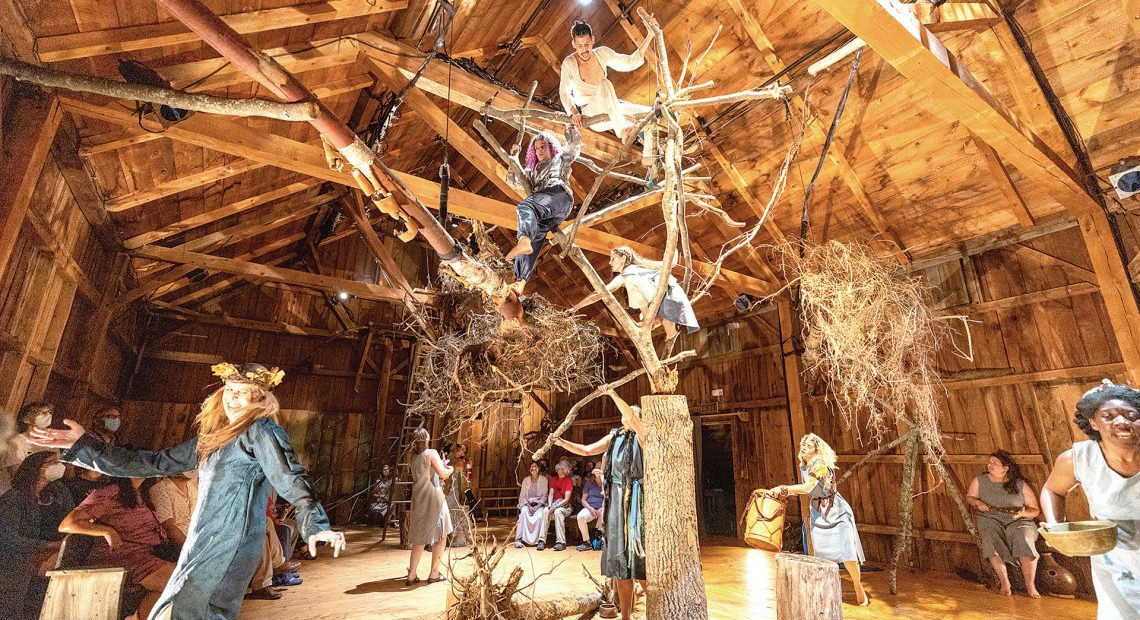
Double Edge Theatre Reflects a Holistic View of the World
Art and Soul
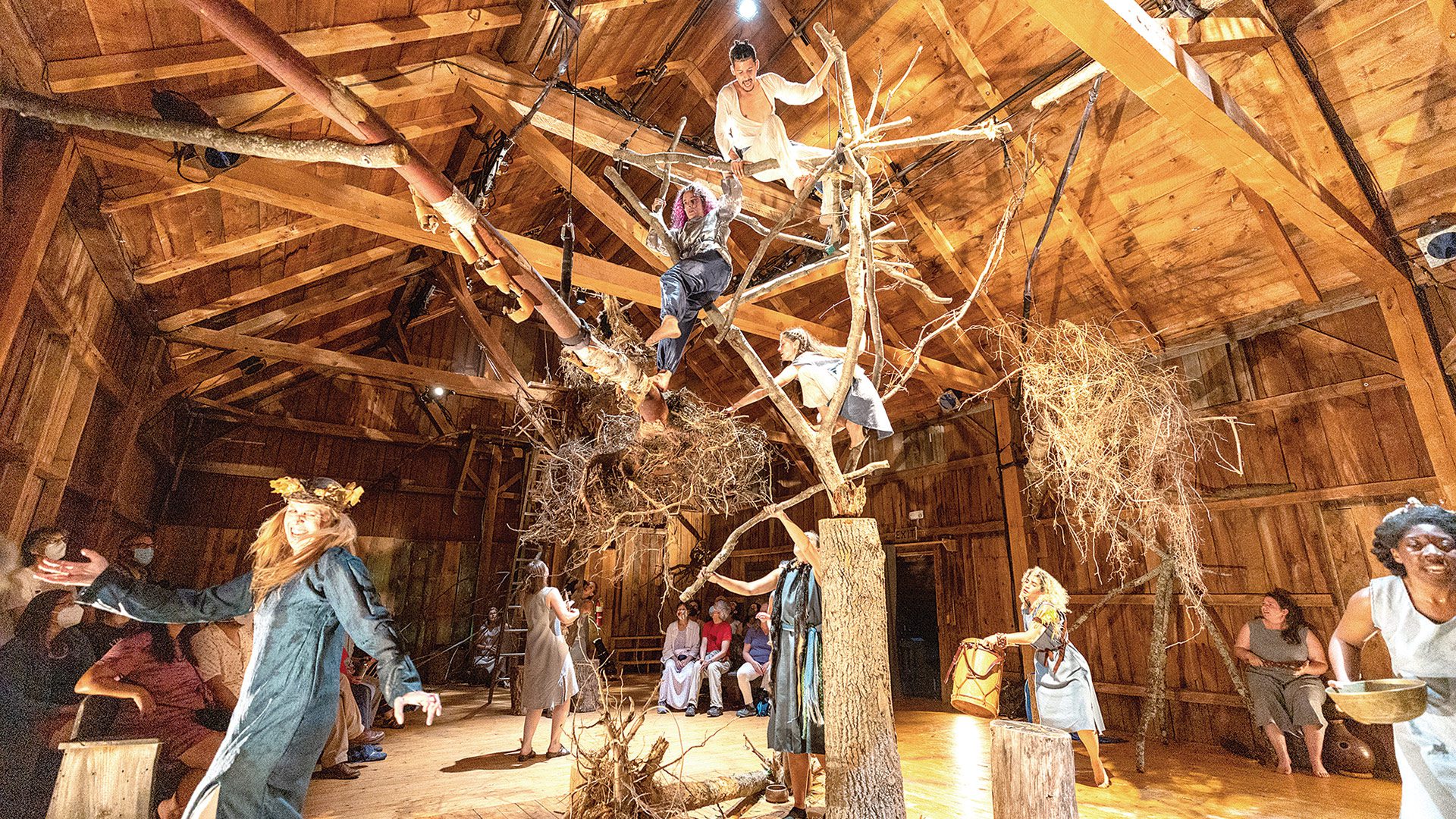
Double Edge Theatre isn’t the easiest organization to describe.
Or, perhaps more accurately, it’s not an entity that lends itself to one obvious description. And that’s a positive thing, said Adam Bright, the company’s producing executive director.
“If you ask a different Double Edge ensemble member or anyone who works here, they’ll have a slightly different answer, I would imagine,” Bright said. “But for me, it’s simply that we’re trying to live together with an understanding, with certain agreements, about how we want to leave the world after we’ve stepped through it.”
That said, “we’re definitely an arts organization first, and everybody here is extremely creatively minded,” he noted. “We all come from different educational backgrounds, different parts of the world, we all grew up in different places, but we’ve all been magnetized to this strange little place.
“Everything you’ll see here comes from that seed of creative thinking,” Bright went on. “The way we’ve renovated the buildings that could no longer be used for dairy farming and were repurposed. The way we create theater and art, and how we integrate that with our work with conservationists, the Native peoples of this area, and how they approach the land. It’s a holistic way of thinking and being.”
Double Edge was born in Boston in 1982 but moved to Ashfield, a bucolic Franklin County community, in 1997, repurposing, as Bright noted, a former dairy farm into a theater company that stages performances, including ‘spectacles’ the audience follows across the grounds (more on those later), but also hosts training programs, workshops, and much more.
It does so while centered on values that are painted in large letters on one of the property’s buildings.
“We’re trying to live together with an understanding, with certain agreements, about how we want to leave the world after we’ve stepped through it.”
“Our vision is to prioritize imagination in times of creative, emotional, spiritual, and political uncertainty,” the message reads. “Our mission is to pursue authenticity, interaction, and identity with whomever is seeking creative, emotional, spiritual, and political clarity. Our art is grounded in a rigorous ensemble aesthetic unfolded in dream, imagery, metaphor, mystery, and symbolism. Our work is created and sustained within an open, honest, meaningful, relevant shared experience. We call this ‘living culture.’”
And then: “Our dedication is to face isolation and erasure, to face despair and pain that can translate into personal incapacity and political paralysis. To uplift. We call this ‘art justice.’”
It’s a mouthful, and Bright knows it. But at its core is a reflection of life that many people in this modern world — especially post-pandemic — have gotten away from.
“I think we’ve isolated ourselves more and more. Even in neighborhoods that seem great, everyone goes to their little boxes, and then they’re isolated,” he explained. “I think what we’re creating here — or recreating, let’s say — is something closer to a village, and that feels healthy. On any given day, there will be 70 people working here, ages 18 to 70-something, from all over the world: different languages, different cultures, different music, all of these things in this little place.”
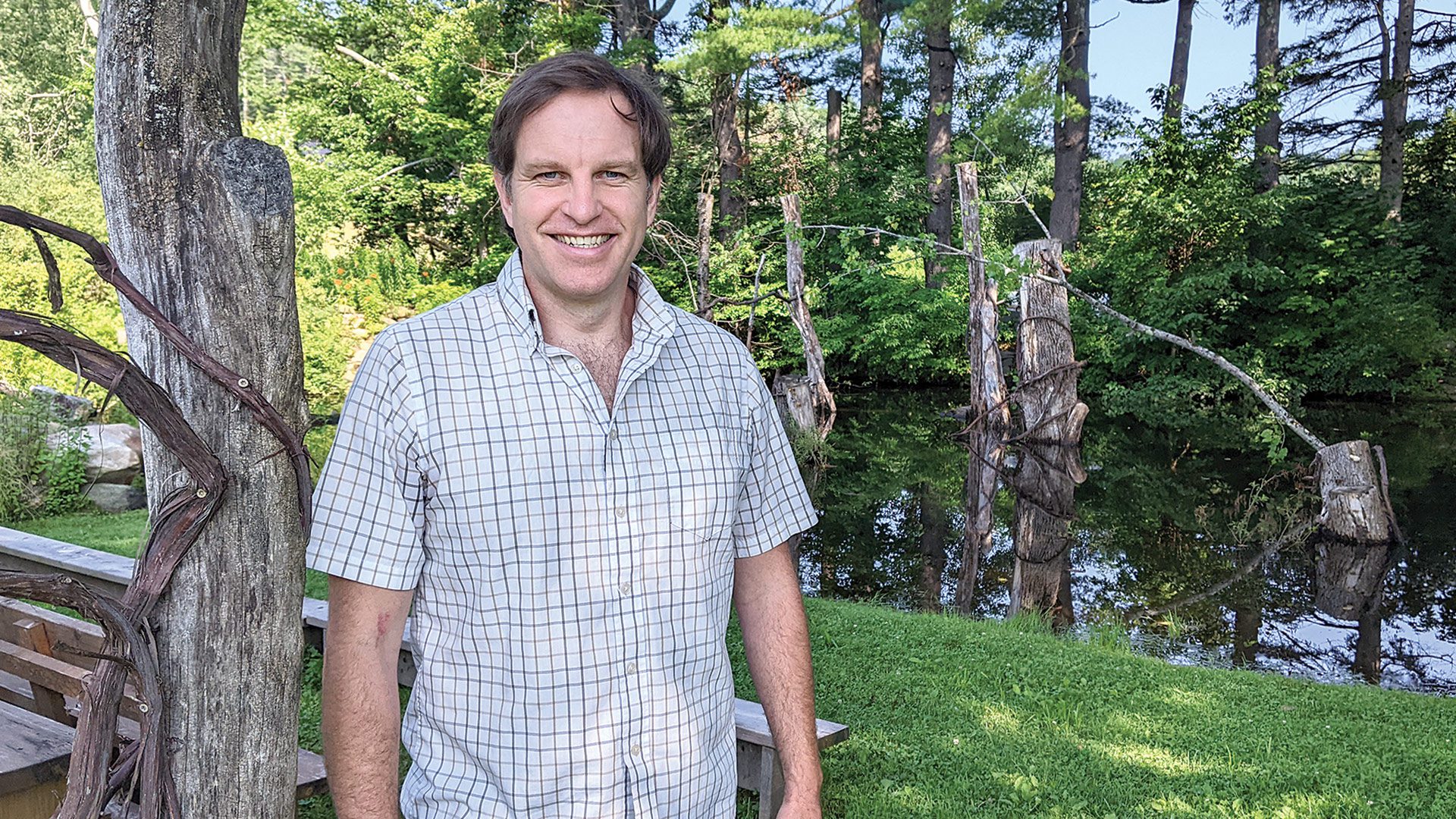
Adam Bright says Double Edge is an arts organization first, but one that is always considering how it interacts with and impacts its community and its world.
As part of that philosophy, Double Edge has taken a keen interest over the years in the Indigenous history of Ashfield and its environs, specifically the Nipmuc Tribal Nation, which traces its lineage in the region back 12,000 years. The theater company has partnered with the Ohketeau Cultural Center in efforts to bring awareness to this heritage and support Native priorities today.
“Our interactions introduced us to the Indigenous peoples who still inhabit this land after millennia, even though their presence has been rendered invisible on the land we now occupy,” Double Edge notes in its literature. “Ashfield may never be ‘diverse’ within the currently circumscribed and restrictive use of the term. However, the mission, values, vision, and work of Double Edge will always reflect the larger population of our region, our state, and our country.”
Making a Spectacle of Themselves
Amid its cultural passions, this is, as Bright noted, primarily an arts organization, and its performances — both on site and touring — have become widely noted for their unique, eclectic, and interactive nature.
“The art is predominantly theater, although we touch all the mediums of art,” Bright said, noting that company members — some live on the grounds for extended stretches, while others commute — not only write and perform works, but build and paint sets; create costumes; handle lighting, sound, rigging, and other production aspects; and more,
The summer performances are called ‘spectacles,’ and it’s an apt term. “They move around this farm, so the whole farm turns into a theatrical stage, essentially,” Bright said. “We really interact with the outside world; there are giant puppets and fire.”
“Even in neighborhoods that seem great, everyone goes to their little boxes, and then they’re isolated. I think what we’re creating here — or recreating, let’s say — is something closer to a village, and that feels healthy.”
The audience — which is capped at 80 to 90 per night — follows the performance across the grounds, both inside and outside its buildings, and are often timed to begin in sunlight and end with dark skies, beside a small lagoon lit by fire and stage lights, lined with platforms in the trees, a trapeze, a trampoline, and more. It’s … well, a spectacle.
“We essentially guide everything, from parking the car through the final hurrah,” Bright explained. “There’s a whole journey that the audience follows, and whether you’re at the front or the back, you’ll experience the whole thing. You won’t miss out on anything, although each audience member experiences it differently.”
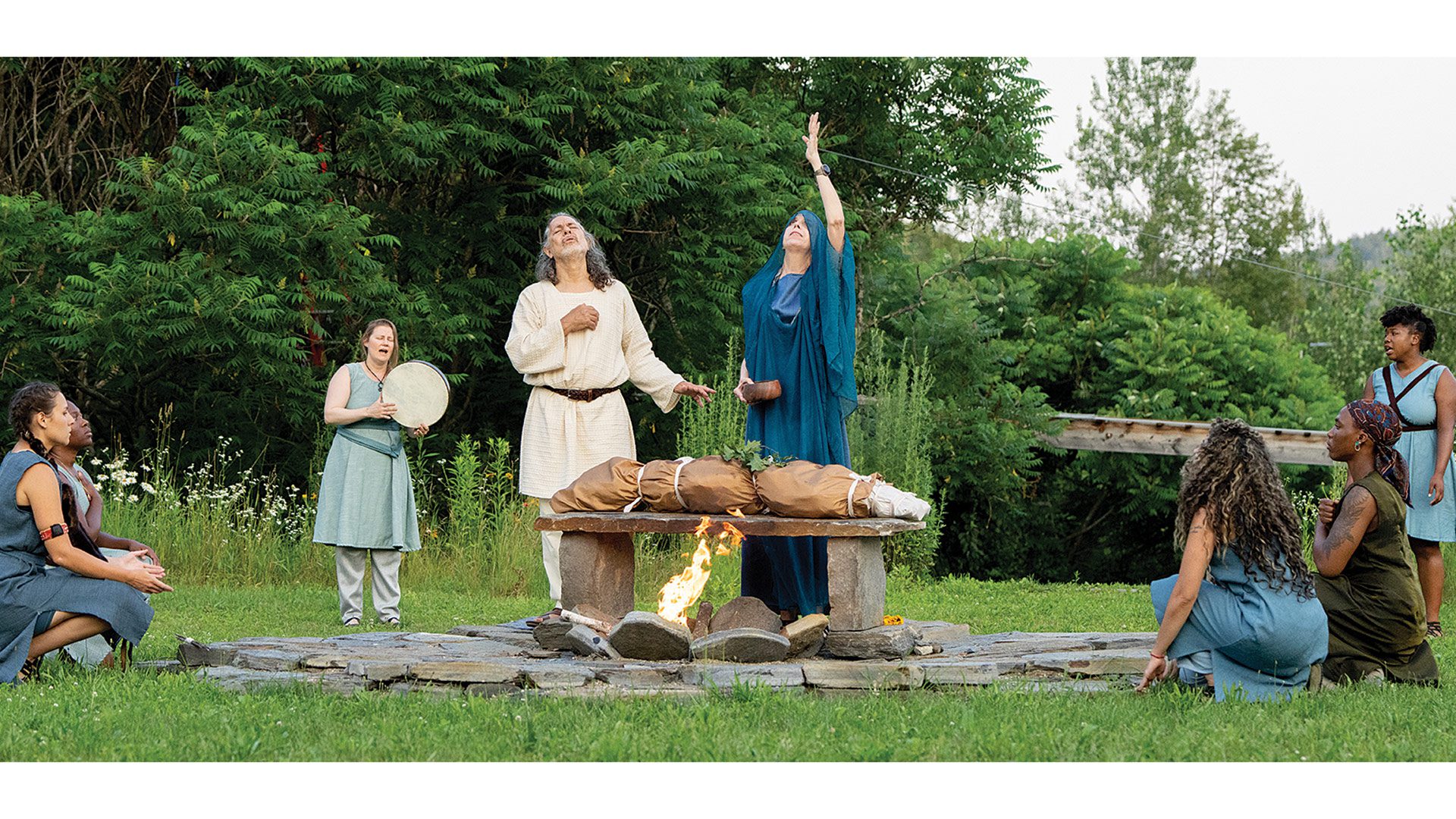
Double Edge creates ‘spectacles’ that move around the farm, so the whole property turns into a theatrical stage.
Photo by David Weiland
The spectacles have been a staple of Double Edge’s offerings for a couple decades. “Lots of people are involved; it could be painting giant murals or doing puppets, making costumes,” he said. “We also work with a bunch of contractors that come in to help us with some heavy lifting, certain set pieces. So, really, lots of people are involved before we even open the performance.”
The current spectacle, directed by Double Edge founder and Artistic Director Stacy Klein, is called The Hidden Territories of the Bacchae, and is “our response to Euripides’ Bacchae, in which women’s rites are no longer in hidden territories and women are freely able to express their deeply held desires,” according to the company’s description. It runs from July 19 through Aug. 6, and tickets are available at doubleedgetheatre.org.
“Then, other times of the year, we make other works that can go into regular-type theatres, and we tour,” Bright said. “We just got back from Europe for a couple of tours there. It’s still large-scale, but it becomes a little bit more intimate, and you can control more in the theatrical setting than outdoors. There are different limitations, I would say. But it’s still visually stunning, very physical, poetic … it’s definitely not your average Shakespeare recital.”
Meanwhile, Double Edge offers residencies and other cooperative oppportunities to like-minded companies across the U.S., he noted. “We come together once or twice a year, and we train together, and sometimes we present each other’s work. So it’s really a cool thing.”
Hannah Rechtschaffen, director of Greenfield Business Assoc., who recently came on board Double Edge as its team and relationships manager, called the organization one of the most well-organized and communicative companies she’s ever worked for.
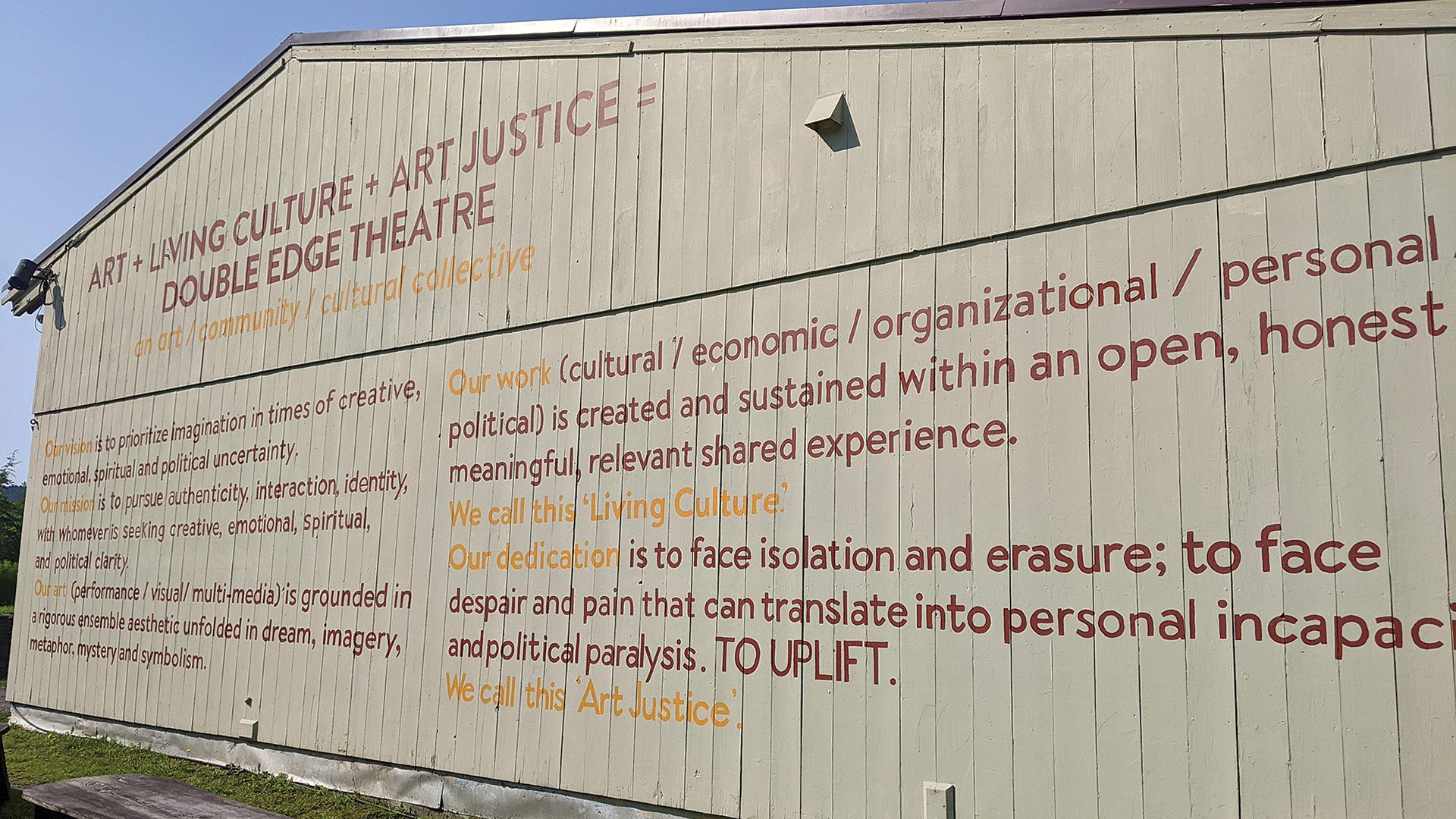
The concepts of ‘living culture’ and ‘art justice’ are integral to the training and performance work going on at Double Edge.
“You don’t find that in a lot of arts organizations. Sometimes the art is taking over so much that the business side lacks a little, and I think one of the real strengths of Double Edge, and one of the reasons that we rise as a real leader and attract people from many sectors, not just the art sector, is because, though our message is really complex, it’s also very clear because it’s being rolled out in a way that a lot of different people can relate to.”
Living History
Klein founded Double Edge in 1982 as a feminist ensemble collective alongside co-founder and emerita ensemble member Carroll Durand and several other women, performing in six-week rentals of various Boston theaters.
In 1985, the ensemble located a parish hall in Allston, a long-unused building at the Episcopal Church of Saints Luke and Margaret. Following renovations, this was its home for the next 12 years. In 1994, the company located a new home in Ashfield, precipitated by the economic impossibility of paying exorbitant rent in the Boston area, and by the desire to house overseas guest artists for long periods.
After driving back and forth for a couple years, the Double Edge team opened their first performance space in Ashfield — in a converted barn — in 1997.
In addition to its spectacles, which launched in 2002, Klein and her team have created seven performance cycles, or series of plays, that have toured around the world, including:
• The Garden of Intimacy and Desire (2002-08), a cycle exploring distinctive visions of magic realism in Jewish and Hispanic culture;
• The Chagall Cycle (2010-15), which was imagined entirely from the visual art of Marc Chagall;
• The Latin American Cycle (2015-18), which began as an effort to come to artistic terms with Co-Artistic Director Carlos Uriona’s sociocultural and personal background; and
• The Surrealist Cycle (2017-present) three performances, loosely woven together, relating to the Latin American Cycle and research into surrealism.
In addition, the Ashfield Town Spectacle & Culture Fair (May 2017) and We the People (summer 2017 and 2018) were a duet and ode to the history of Ashfield and the surrounding hilltowns of Western Mass. Eighty local artists and groups participated in each two-day event, which took place throughout the entire town of Ashfield, ending in a 700-person parade and an aerial flight over the Ashfield Lake.
“There’s a whole journey that the audience follows, and whether you’re at the front or the back, you’ll experience the whole thing. You won’t miss out on anything, although each audience member experiences it differently.”
Clearly, a sense of place and culture is a constant theme here, and Double Edge itself is a model for a living community. About 10 years ago, the ensemble started thinking about ‘greening’ and the necessity of moving off the grid, “not only as giveback for what we receive from nature, but also as a model for theaters around the country and other organizations who are themselves modeling unsustainable building and operating practices,” the organization notes.
With that in mind, single-use plastic was banned from the farm for our students, audiences, and daily living, and the property has also started using solar energy and wants to replace all its heating systems, with the dream of building a solar farm and multi-acre apiary and wildflower sanctuary.
So, yes — this is a theater company with a lot on its mind, one that takes a holistic approach to art and life, striving to find the critical connections that often get lost in today’s world.
“I’m always in the intersection of economic development and the creative arts, and how those things come together,” Rechtschaffen said. “It’s a constant process of figuring out how to communicate that in a way that every sector can understand. I think that’s something that we do incredibly well and have an opportunity to do even more — to figure out how to grow that impact.”





